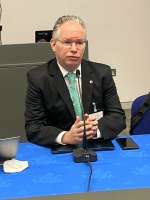Global Forum on Higher Education Leadership for Democracy, Sustainability, and Social Justice Dublin from 15-17 June 2022.
Date:
Event location: Dublin
Type: Special Events

The Magna Charta Observatory was well represented at the recent Global Forum on Higher Education Leadership for Democracy, Sustainability, and Social Justice, that was held in Dublin from 15-17 June 2022.
The Global Cooperation Forum for the Democratic Mission of Higher Education comprises the Council of Europe, the International Association of Universities, the International Consortium for Higher Education, Civic Responsibility and Democracy and the Organisation of American States. The Magna Charta Observatory is represented on its steering Committee by its Secretary General, David Lock.
David was a rapporteur at the forum and Council member Marcelo Knobel was a panellist in the session which focussed on what international practices help sustain and engage the most at-risk students, while ensuring that all students are educated to be ethical, empathetic, justice-seeking democratic citizens.
Marcelo described the democratic processes within the University of Campinas (Unicamp), at which he had recently completed his term as Rector in 2021. In this University, around 50,000 people are usually involved in the election of the Rector. Once appointed, the Rector has to work with a rather large Senate to ensure that the academic community is involved in the decision making processes of the university. He spoke of the extensive involvement with the community with some 8000 activities per year in what is called “extension” in the Brazilian context. Just to mention one example, six and a half million people use the high-complexity health services provided by the university.
The university is public, and no fees are charged for any students. Furthermore, an extensive number of scholarships are given to assist poorer students with living costs. This had served to enable students to complete their courses and reduce the drop-out rates. Marcelo Knobel described some recent actions that were implemented during his term, related to citizenship role of universities. A Directorship for Human Rights was created, a quota system was recently adopted and a specific entrance exam was implemented for indigeneous students. Also, Refugees were welcomed without having to pass the entrance examination.
During the pandemic, some 20,000 students had been assisted with payments for computers, internet connections, emergency scholarships and other needs. While there is not a culture of philanthropy in Brazil, the university had started it and had established an endowment fund to connect with its community.
More generally in the conference there was a view that values and goals concerning the democratic mission of universities should be made more explicit and that current and prospective future leaders should be prepared to implement them and communicate more about them. The values should be included within the curriculum. Universities were urged to work together with other universities and global networks in taking forward this work.
A full report on the event will be published in due course and the MCO website will contain access to it. The findings are expected to make their way into various policy documents. Hopefully the outcome will be that the democratic mission of universities will achieve a higher profile both with staff and students within the university and the external stakeholders with which the university interacts.
David Lock
Secretary General
18-6-22